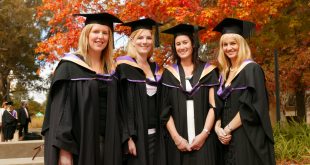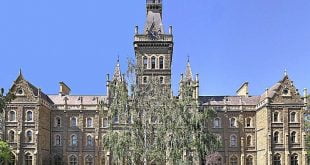When it comes to Australia, the first things that come to mind most certainly are the country’s famous landmarks, along with its picturesque and diverse landscapes. But Australia is also associated with multiculturalism, with an international student population of almost 800,000, more than 350,000 of them at the higher education level. The country has remained in the last decades among the top study destination in the world. And if you’re among those who have chosen Australia as your study abroad destination, here’s a guide to help you get the most of your experience in the country.
Why study in Australia
There is no shortage of reasons to why choose Australia to study abroad. As an international student, you’ll find out soon that the country’s education system promotes creativity and innovation, multiculturalism and independent thinking. The country is at the forefront of research in the fields of education, humanities, and science.
Studying at Australian universities will be most certainly challenging, but it’s also fun and very rewarding. Graduating from a university in Australia will open the door to many interesting work opportunities internationally. This is possible, thanks to the fact that 6 of the best universities in Australia are among the top 100 institutions in the world.
Read here our guide on the top universities in Australia where international students choose to study.
Next to the world-class education, the other reason to study abroad in Australia is the student life. The country offers students the chance to grow personally and intellectually in a young, multicultural and vibrant study environment. Moreover, Australia has encouraged a greater international student mobility, thanks to scholarships and funding.
Learn here about the best scholarships you can apply for in Australia.
How do I prepare to study in Australia?
The very first step if you plan to pursue academics in Australia is to explore your study options. And the good news is Australia has plenty of interesting options to choose from. And that’s the case, whether you want to study at an Australian university or get a vocational training for a more practical learning.
There are also many study fields you can specialize in, from engineering to humanities, law and medicine, and anything in between. Higher education institutions in Australia are there to provide you with the best possible training and to prepare you for success. So, make sure to do thorough research to weigh down all your options, and choose the right institution and program that best fit your future career goals.
Requirements to study in Australia for international students
In our guide on the requirements to study abroad in Australia, we have listed all the different types of higher education institution you can choose from.
- Universities if you plan to pursue academic studies and research. Universities in Australia have an excellent reputation, 6 of them being among the top-rated institutions globally. Students in Australia usually choose to take separate courses for 1 or 2 semesters. You can earn a bachelor’s degree in 3 years, a master’s in 2 years then a PhD.
- Vocational Colleges are for more professionally-oriented trainings. It’s the best choice if you want to pursue a more practical education in a creative field. Moreover, these vocational colleges are smaller than universities. You can earn either a diploma after a year of study, or a bachelor’s degree in 3 years, like in universities. Colleges are also less expensive than universities in Australia.
- Language Schools are the best place to check out if you plan to improve your English in Australia. You can also study in this type of institution if you want to get training in order to teach English as a second language.
Once you have chosen the institution you want to study in, your next move is to check the requirements as well as the application deadlines. In most cases, you’ll have to register through an online portal where you need to create an account beforehand. Next, you’ll have to upload your documents then submit your application.
For more details, read our guide on how to apply to universities in Australia.
Study medicine in Australia
Medicine is among the most-sought programs among international students in Australia. If you’re thinking of becoming a doctor, Australia has some of the top medical schools you can check out.
You can also read our guide on how to study medicine in Australia for more details on medical studies in the country. Usually, you need to complete between 5 and 6 years studies to earn a MBBA. Then you’ll have to undergo 1 year of internship and 1 to 2 years of residency.
Lastly, a medical degree from an institution in Australia is recognized in the UK and in the US. Moreover, the criteria to get in medical schools in Australia are quite similar to those in the UK or in the US. Starting with a minimum GPA of 5.0 along with a MCAT score exam of 511 on average.
The other requirements vary from a university to another. Get more details in our guide on medical study in Australia.
How much money do you need to go to Australia for study?
To study abroad in Australia, the largest part of your budget is certainly the tuition fees, then the accommodation cost. Education cost ranges from AUD 18,000 to AUD 50,000 per year at Australian universities.
At undergraduate level, the tuition can get up to AUD 50,000 per year. A master’s, on the other hand, can cost up to AUD 50,000. Lastly, it will cost a maximum of AUD 42,000 per year to earn a PhD in Australia. Medical studies are the most expensive subjects. However, an MBA in Australia can get as affordable as AUD 11,000 and as costly as AUD 121,000 per year.
Vocational training colleges, on the other hand, will cost between AUD 4,000 to AUD 22,000 per year. And language schools will charge around AUD 300 per week.
Learn more on this study and living cost for students in Australia in our guide on the subject.
Study visa requirements in Australia
Once you get your admission confirmation from a university or college in Australia, the next step is to apply for a student visa. There are usually 5 types of study visa in Australia for international students. The kind of visa you need to apply for depends on the type of studies you plan to pursue. The requirements depend as well on the type of visa.
General requirements for a study visa in Australia include:
- English language proficiency, with a IELTS score band of at least 5.5
- Proof of financial means to support the student’s cost of living for the duration of their studies
- Health insurance coverage
- Admission confirmation from an Australian institution of higher education
You can find the other criteria on the website of the Australian Ministry of Foreign Affairs.
Living in Australia as an international student
One of the reasons why Australia attracts this many international students is the life as an international student. Australia is a land of cultural diversity, something many students will find fascinating and sometimes intimidating. But the large student population will be a great help in finding your marks.
You can also get more insight in our guide on the customs and traditions in Australia.
The other concern would be getting used to the Australian climate, which can vary depending on the area. In fact, Australia has diverse environment and the climate also varies depending on that: from deserts to beaches and grazing lands.
And since the country is quite large, you should also arrange for transportation cost in your monthly budget. As a matter of fact, the Australian public transportation is pretty efficient and international students can get around by bus, train, bike, car or even by plane.
After graduation
We’ve covered everything from before you go to pursue your studies in Australia to the student life in the country. This guide on how to study abroad in Australia won’t be complete without the topic of post-graduation options.
After you get your degree in Australia you may be wondering if you’re going to return home and apply what you’ve learned in your home country, or if you’re going to study further to get a higher qualification. The other option is to take your chance anywhere else in the world, and the fourth choice is to stay back and work in Australia after your studies.
Any option you choose is good. And if you plan to go on the route of a higher degree, you can check our resource on how to get a PhD in Australia. Moreover, if you plan to work after your studies, you should know that Australia has a Skilled Migration Program you can check out. The basic criterion is for you to be skilled in a field that is highly in demand in the country, among other requirements.
Check out our guide on post-study visas in Australia to learn more.
This post is also available in fr_FR.




 Aljawaz Your guide to study abroad
Aljawaz Your guide to study abroad













